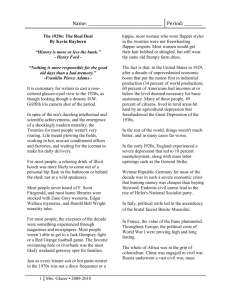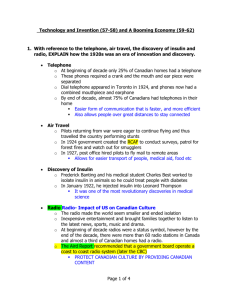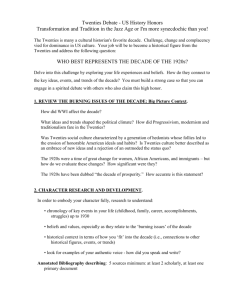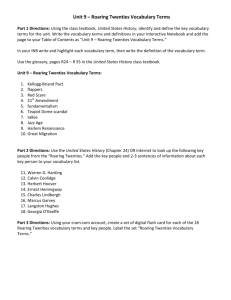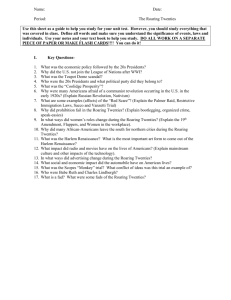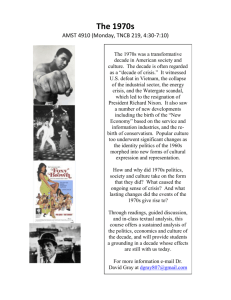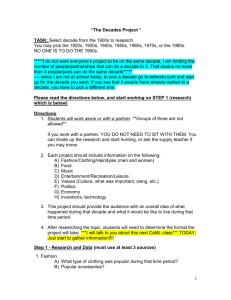canada's diamond jubilee expo 2013
advertisement
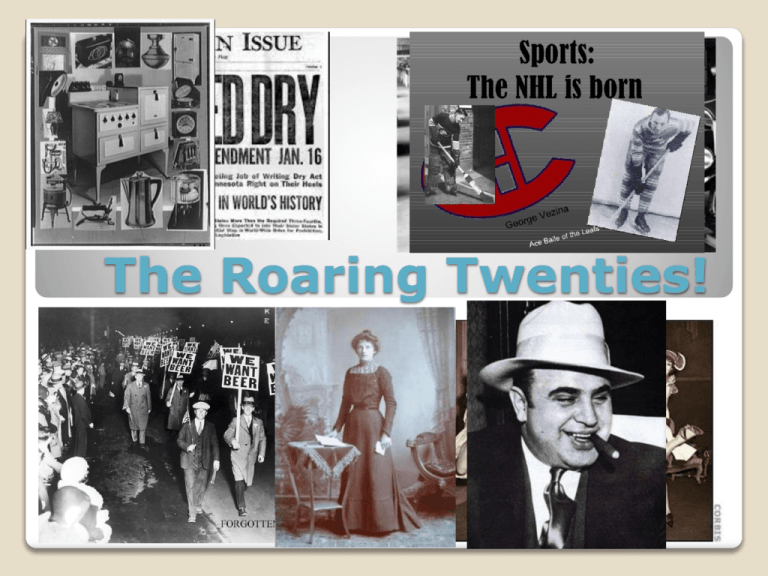
The Roaring Twenties! “It was an era of new prosperity…. A social and cultural revolution was evident in the new clothing styles, changes in mass entertainment, growth of spectator sports, increasing leisure, and mobility… Canada was evolving towards political independence…. Yet the twenties was also a decade of trouble and contradiction. The prosperity was not shared by all….Immigrants continued to come [and] found unexpected prejudices….Differences in attitudes and values developed between young and old… [and] youth responded to the new industrial culture brought to them by advertising, radio, jazz, films, and the automobile.” In short, for many the decade offered cause for celebration; for others, the “Roaring Twenties” would not live up to the hype. The Roaring Twenties? Use the Scrapbook to complete chart. ◦ Gather examples and evidence from primary sources ◦ Use these to record reasons to celebrate the decade ◦ What evidence can you find that might suggest the decade didn’t live up to the hype. ◦ Have fun looking at the sources. For example, talk of the decade, the cartoons, etc.. Investigating the decade CANADA’S DIAMOND JUBILEE EXPO 1927 The year is 1927 and the Liberal government of Mackenzie King has decided to celebrate the success of Canada as a newly recognized country on the international scene. The celebration will take the form of a two day exposition, with keynote speakers, presenters, displays and entertainment, the purpose of which will be to both educate and entertain. It will certainly be an opportunity to showcase the accomplishments of the young nation and its people. Like with any exposition focusing on national accomplishments, there will be protests from individuals and groups who may not share the same optimism for the state of the country. The context Imagine that you are a member of the organizing team for the Diamond Jubilee expo. You’ll need to decide on: ◦ A keynote speaker ◦ 3 Presenters/ speakers to present on three key developments in Canada during the 20s ◦ 2 Exhibits / Entertainment And plan for the possible protests ◦ Not everyone will be in the mood to celebrate. The Task Option 1: Complete the booklet of worksheets Option 2: Use the rubric as a guideline to create your own record of information and details. The research stage: Researching the 1920s • How successfully would Johnny Canuck achieve a distinctly Canadian nation? • What kind of nation would be developed? – Society, culture, technology, equality, leisure • How much did the decade roar? Describe the changing roles of women in terms of social, political, and economic change in Canada during the 1920s (p.72-73 and scrapbook) • How much did things really change for women? • Key people, events/ terms: – Agnes Macphail, Emily Murphy and the Famous Five, Persons Case, flappers, domestic technologies (inventions for the home), fashion Can identify and describe the significance of events contributing to cultural and economic autonomy and national identity with reference to - distinctive Canadian programs and policies taken to promote a distinct Canadian identity - Impacts from foreign influences, programs and policies. − important Canadian cultural and scientific achievements (p. 63, 67-71, 84) • Key ideas / event / issues – How did the United States influence Canadian Society • Economics? Branch plants and U.S. influence (pros and cons), prohibition • Society, culture and identity? Technology, transportation, arts, leisure, literature, sports… – How did new technologies impact society? • Mobility and communication, inventions and inventors, – Film and Marie Pickford, Group of Seven, Emily Carr, magazines, sports Can identify and describe the significance of events contributing to national autonomyp.80-83 • • • • • • Autonomy Chanak Crisis Halibut Treaty King/Byng Crisis Balfour Report Statute of Westminster Can explain the challenges faced by minorities and Aboriginal people in Canada, the impacts of these challenges and their responses (p.74-76) • Assimilation, residential schools, potlatch, Aboriginal title, cut-off lands, Indian Act, enfranchisement, self-determination, Chief Deskakeh • Discrimination, segregation, KKK • Chinese Exclusion Act 1923, labour conditions • "The Exclusion Act, it affected my family in a very real way. During that exclusion period, my grandfather did travel to China several times, but he wasn't able to bring my mother, my aunt, my grandmother over until the Exclusion Act was lifted in 1947." Landy Ing-Anderson Can define regionalism and relate it to alienation and the changing political landscape of Canada p .77-79 • Maritime rights movement • National Policy vs. free trade in the Prairies, United Farmers Party, Progressive Party. • Quebec and industry • B.C. resources and the ports • Choosing a new government and the impact of the Progressive on Federal politics • Old Age Pension Act 1927
